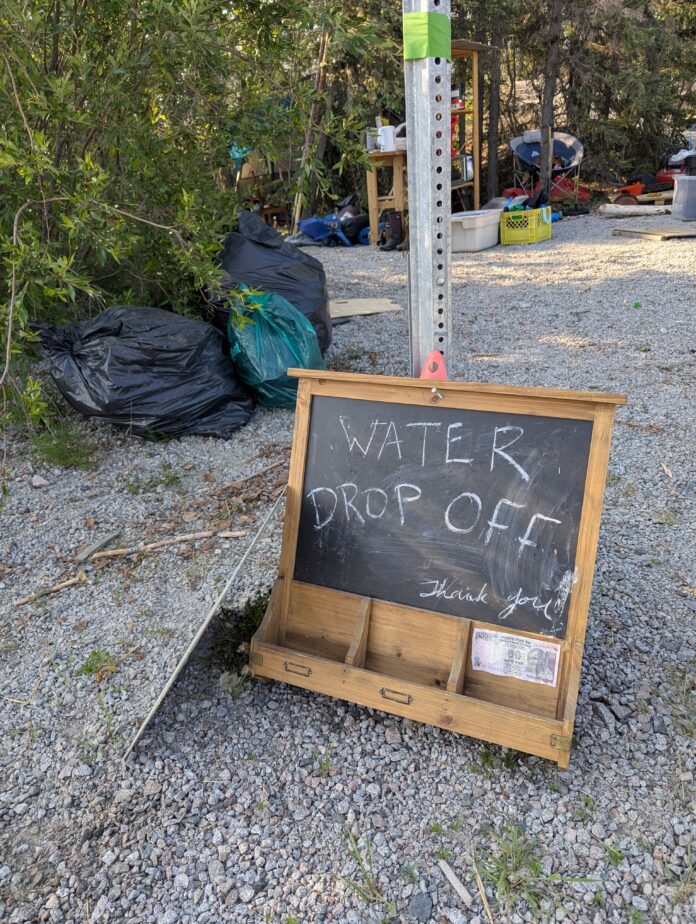GNWT has decided not to provide potable water or other infrastructure at an encampment, which was recently relocated to the Northern Heritage Museum site from a location in downtown Yellowknife. Earlier this month Michael Saturnino, Associate Deputy Minister, Housing Sustainability had affirmed GNWT’s focus continues to be supporting individuals through “ safer, structured alternatives” like emergency shelters and “diffuse camping” on Commissioner’s Land.
Earlier this month, city council passed a unanimous motion calling on the territorial government to assist in “filling gaps” for necessities at the encampment. Councillor Cat McGurk expressed concerns about providing potable water as it is considered a basic human need.
This week, James Tolley, GNWT’s Director of Policy and Planning, says the territorial government does not support what he called “more permanent or concentrated structures” because of “elevated safety, health, and liability risks.” Tolley said for this reason, officials decided to not provide potable water.
The GNWT’s decision not to provide potable water or other infrastructure at the encampment near the museum was based on several considerations.
“While we support diffuse camping on Commissioner’s Land, a long-standing practice in Yellowknife, we do not support the establishment of encampments, which are defined by more permanent or concentrated structures and often present elevated safety, health, and liability risks,” said Tolley.
“Diffuse camping” is considered camping on publicly owned lands.
“To assist those who choose to tent, we have provided maps that highlight locations of public washrooms and garbage receptacles, allowing individuals to camp close to these amenities and reduce some of the concerns associated with people sleeping rough in the city,” said Tolley.
“Instead of directing further resources into encampments, the GNWT is directing resources towards ensuring emergency shelter space is available for those who wish to access it, where essential services such as food, water, sanitation, and health supports are already available in a safe and supervised environment. In addition to this, the GNWT is establishing additional transitional housing options for people experiencing homelessness, which will provide longer term supports for housing stability. That said, we recognize the importance of harm reduction and are working with partners, including the City of Yellowknife, to assess and respond to immediate public health needs,” Tolley added.
A few weeks ago, Michael Saturnino, Associate Deputy Minister, Housing Sustainability and Partnerships, told True North FM that GNWT’s focus continues to be supporting individuals through “safer, structured alternatives” like emergency shelters and “diffuse camping” on Commissioner’s Land.
Saturnino said the GNWT will continue to provide support to 95 emergency shelter beds available in Yellowknife, which report occupancy rates below capacity.
“For those who choose not to access shelters, we are supporting diffuse camping on Commissioner’s Land and working directly with individuals to identify safer, more stable alternatives,” said Saturnino
The Associate Deputy Minister explained that the GNWT is also focused on addressing the “safety concerns” that some residents are concerned the encampment could potentially pose.
“The GNWT is working closely with community partners, including the RCMP and health authorities, to monitor the area and ensure safety. We are also engaging directly with individuals in the encampment to promote respectful use of the space and reduce potential conflicts with the public,” said Saturnino.
Saturnino explained that the GNWT does “not formally sanction” encampments (in the city of Yellowknife or anywhere in the NWT at this time) and is working to secure transitional housing for those facing homelessness.
“However, we recognize that some individuals may choose to camp on Commissioner’s Land during the summer months. Our goal is to support transitions into safer, more stable housing options as they become available. We will continue to monitor the situation and work with individuals to identify appropriate alternatives,” said the Associate Deputy Minister.
Saturnino said that the GNWT currently does not have plans in place to add infrastructure such as fencing or portable toilets to the site.
“Our focus is on encouraging the use of designated shelter spaces and diffuse camping areas that are better equipped to support health and safety. We continue to assess needs and may adjust our approach as necessary in collaboration with community partners.”





